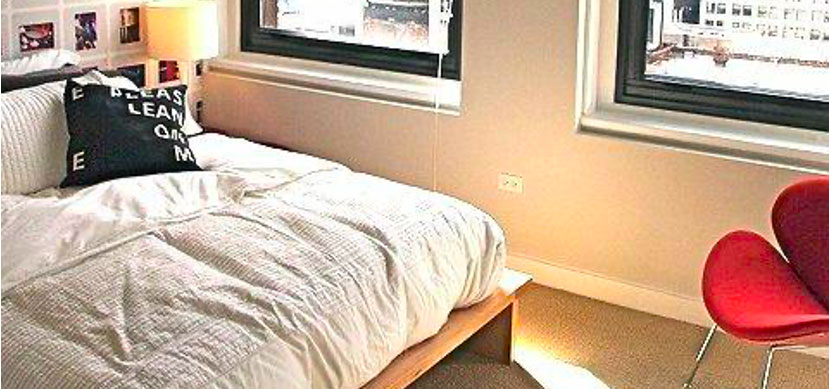Do You Really Need Renter’s Insurance?
We’ve heard the story many times. A parent explains to their university-bound son or daughter to get renter’s insurance. And, like most college kids would, they promptly push this bit of parental advice out of their minds.
Big mistake. We had one customer who told us that when their son got back from winter break in his first year of university, his apartment had been broken into. Everything gone. His TV, computer, and other personal items all taken. And, because the poor student had no money, our customer had to pay up to replace everything.
While moving into a new place can be a chore, don’t forget to make sure you (or your son) have the coverage and protection you need in case of an emergency. If you are not sure what exactly it is you need in a renter’s insurance policy, or still have questions, we’ve got the answers.
Why Do I Need Renter’s Insurance?
Most apartment complexes and landlords only have insurance that covers the damage to the actual dwelling, which leaves everything of yours—electronics, furniture, clothes, whatever—vulnerable. So, to protect your belongings in case of fire, theft, or damage, you need your own policy, called a renter’s insurance policy.
You also need liability coverage for damages caused by negligence. For example, if you accidentally leave the kitchen sink on and it overflows into your neighbors’ apartment, you could be found liable for that damage—and required to pay for repairs, medical bills related to the accident, as well as defense costs if they bring a suit against you. Renter’s insurance would cover those costs.
No, none of this is fun to think about, but it’s a lot easier to plan (and pay) for it before it actually happens.
What Exactly Will My Policy Cover—and What Won’t It?
1. Personal Property
Most standard renter’s insurance policies offer protection for your belongings in case of power surges, water damage, fire, vandalism, theft, and other events out of your control. However, most do not cover damage caused by flood water, earthquakes, mudslides, or nuclear hazards.
Also keep in mind that certain types of property will only be covered up to a limit set by your insurance company (for example $2,500 for electronics and $1,500 for jewelry and furs). So, if you have an engagement ring, a customized computer, an expensive set of golf clubs, or even a signed Gretzky rookie card you should consider purchasing an additional personal articles policy. These add-ons to your renter’s insurance are typically inexpensive (we’re talking a few dollars every month) but will protect those really important items that would be costly to replace.
2. Loss of Use
Your policy also covers your living expenses in case you must leave your home after an accident. Say a tree crashes through your roof and the place needs repairs before you can live there again—loss of use will cover a hotel, food, and any other expenses you incur during that time.
3. Liability
Your liability coverage pays for bodily injury and property damage caused by negligence—like if your dog gets loose and bites the neighbor’s kid and he has to get stitches.
You’re not, however, covered for negligence for expected or intended bodily injury (you throw a baseball in a parking lot trying to hit your neighbor), business pursuits (the cupcakes you bake in your apartment to sell at a market make someone sick with food poisoning—you would need a business owner’s policy), or vehicle-related damage or injury (your emergency brake fails and your parked car hits someone—auto insurance covers this).
How Much Coverage Do I Need?
Many landlords require their tenants to have a minimum of $100K in liability coverage. If your landlord doesn’t have this guideline, talk to an insurance broker to determine how much coverage you need.
For property damage coverage, one of the first questions the broker will ask you is how much your stuff is worth. While that seems like a simple question, when you really start to think through what it would cost to replace everything in your apartment, it can get tricky. And it can add up. More importantly, even if you can’t put a dollar value on all that you have, take photos or videos of your place and your most important belongings. This way, in case of a catastrophe, you’ll have a record of everything and can think through how much everything is worth at that point.
I Need This! Where Do I Get a Policy—and How Much Will it Cost?
First, contact your insurance broker who is providing your auto insurance—most will be able to give you great discounts if you bundle both policies. Sometimes the savings on your auto policy will pay for the renter’s insurance policy!
Renter’s insurance is not a big premium. And let’s face it—it’s a small price to pay for the peace of mind it provides and the coverage you’ll wish you had if something bad happens.
If you would like more information on renter’s insurance, or if you have any questions on your home or auto insurance, please contact Munn Insurance toll free at 1-855-726-8627 today.
Related News
Recent News
How to Save on Insurance Amid Uncertainty of Tariffs and Trade Wars
In today’s global economy, trade wars and tariffs are a hot topic, and their potential impacts reach beyond just the cost of goods like cars, appliances, and steel. If tensions between countries like Canada and [...]
Get the Best Auto Insurance Quote in Nova Scotia: A Step by Step Guide
When it comes to auto insurance, everyone wants to ensure they’re getting the right coverage at the best price. Whether you're a first-time car owner or a seasoned driver in Nova Scotia, the process of [...]
Unlock Big Savings with Group Insurance Discounts
At Munn Insurance, we know that everyone loves saving money—especially when it comes to home and auto insurance. Did you know that you may qualify for exclusive discounts just by being part of certain groups [...]












